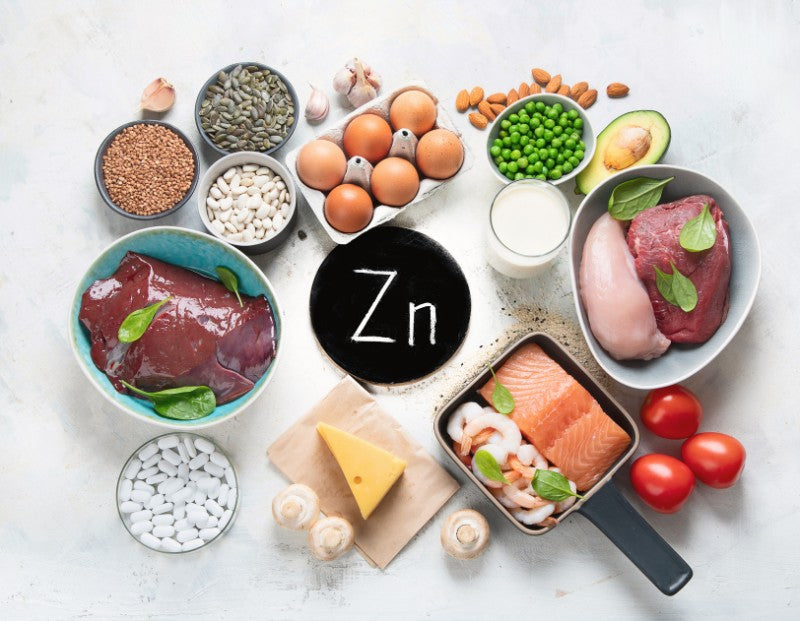Zinc is a trace element provided by food that is essential for proper physiological functioning. Slightly deficient intakes are common and lead to discomfort related to greater susceptibility to infections, slower healing, excessive fatigue, etc.
How do you know when to start a zinc treatment and how long to continue it? This article will explain the best times to start a treatment, the expected benefits, and the precautions to take.
Zinc, a trace element essential to the body
Zinc is involved in over 300 reactions essential for proper physiological functioning. It plays a major role in cell growth, wound healing, immune system support, and protein and DNA synthesis [1].
It is particularly important for the good health of skin, hair and nails, and helps regulate sebum production, making it anally against acne . Without sufficient intake, zinc- dependent functions are impaired, with often noticeable and noticeable repercussions.
The consequences of a zinc deficiency
Zinc deficiency can have multiple physiological implications. It weakens the immune system and increases susceptibility to infections , particularly respiratory infections such as colds and flu.
Wound healing can also be slowed. Skin problems such as dryness, acne , or redness are more pronounced when zinc deficiency is permanent.
Zinc deficiency can also disrupt taste and smell and/or lead to persistent fatigue [2].
If you notice any of these signs, it's a good idea to reassess your dietary intake, possibly with a blood test. Dietary supplements provide an easy and safe solution for this.
When and why should you take a zinc treatment?
A zinc cure may be recommended in several situations:
- Zinc deficiency : If you experience signs such as severe fatigue, brittle nails and hair, loss of taste, or frequent infections.
- Periods of increased need : During growth, pregnancy, breastfeeding, or adolescence (to reduce skin problems such as acne).
- Athletes : Zinc requirements increase to compensate for significant losses due to physical exertion.
- Vegetarian and vegan diets : These diets increase the risk of zinc deficiency, because the phytates present in cereals and legumes reduce the absorption of this trace element [3].
If you suffer from frequent infections, or if your skin and hair are fragile, a zinc regimen can help strengthen your natural defenses and improve the quality of your skin tissue. Zinc also supports hormonal function, which can be beneficial during times of hormonal changes in both men and women.
Can I take a zinc cure all year round?
It is generally unnecessary to do a continuous treatment throughout the year except in special conditions (pathology, very deficient diet) and in this case a blood test at least annually is recommended.
Zinc is relatively well stored in the body and occasional corrective treatments are generally sufficient to replenish the body's reserves.
Excess Zinc can lead to an imbalance in the absorption of other minerals, especially copper [4] as well as nausea sensitivities.
Zinc cures are often recommended for 1 to 3 months, depending on your specific needs. It is best to follow cycles of zinc cures (one to 3 per year), interspersed with break periods. If you have specific needs: convalescence period or immune weakness, intense sports practice or during pregnancy and breastfeeding, medical monitoring is recommended to adjust the duration of the cure and the daily supplemental dosage.
Precautions to take during your Zinc treatment
As with all other micronutrients, there is a range of optimal intakes. For a safe and useful zinc cure , it is essential to respect the recommended doses to avoid overdosing, which could lead to side effects such as nausea, vomiting or digestive disorders [5]. Labels compliant with European and French standards provide all the necessary information.
Scientific studies show that there are no real negative reactions to excess zinc at less than 40 mg of zinc/day for an adult and for long periods (several weeks).
Taking into account current dietary intake, this corresponds to an intake of 25 mg/day via supplements (Upper Safety Limit defined by health authorities), which is double the recommended daily intake for adults. There is no point in having regular intakes at these excessively high doses.
Our zinc bisglycinate supplement in a 2-month course
To ensure you get an optimal, effective, safe and healthy intake of Zinc, we have designed a formula based on Zinc Bisglycinate , supplemented with vitamins C and B6, selenium and methionine (for its role against acne).
This form of zinc is well absorbed by the body, [6] without risk of digestive disorders.
Our supplement is suitable for taking as a 1 to 2 month course, dosed at 10 mg of Zinc per day (one capsule, or 100% of average adult requirements), which avoids the risk of actual overdose, even when taking into account satisfactory dietary intake.
Like all Argalys formulas, it is free from colorings, sweeteners or other controversial additives (only: coconut flour, acacia fiber and rice bran).
References:
- “Zinc and human health: An update” - https://pubmed.ncbi.nlm.nih.gov/23836054/
- “Taste and smell dysfunction in zinc deficiency” - https://pubmed.ncbi.nlm.nih.gov/11686092/
- "Zinc status and its role in immunity and inflammatory disease" - https://pubmed.ncbi.nlm.nih.gov/20620257/
- “Effects of zinc supplementation on copper absorption” - https://pubmed.ncbi.nlm.nih.gov/20093829/
- "Zinc toxicity and tolerance levels" - https://pubmed.ncbi.nlm.nih.gov/30387858/
- "Zinc bisglycinate: A highly bioavailable form of zinc" - https://pubmed.ncbi.nlm.nih.gov/31089723/
 04 74 03 98 80
04 74 03 98 80










